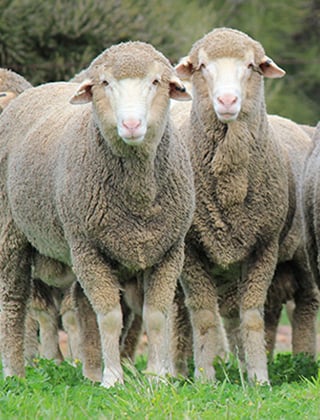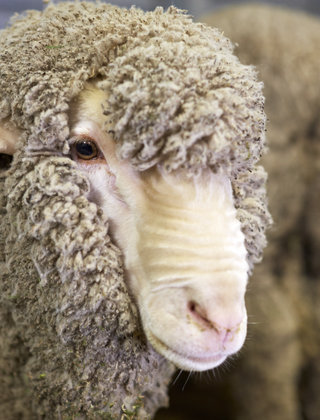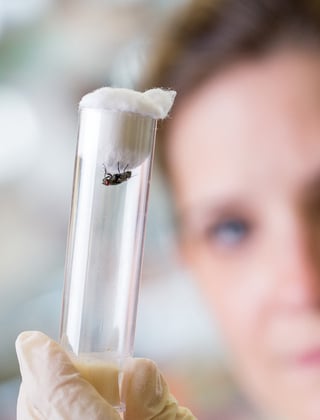AWI sheep classing workshops

AWI’s hands-on sheep classing workshops resumed in July on properties across eastern Australia, following the easing of restrictions related to COVID-19. The workshops are aimed at helping woolgrowers in their sheep selection and breeding programs to increase the productivity of Merinos.
A spectacular South Australian backdrop to the sheep classing workshop held at Tom, Angus and Matt Ashby’s property ‘North Ashrose’ at Gulnare in October. AWI’s sheep industry specialist Stuart Hodgson is explaining the practical skills involved in sheep classing.
AWI’s hands-on sheep classing workshops resumed in July on properties across eastern Australia, following the easing of restrictions related to COVID-19. The workshops are aimed at helping woolgrowers in their sheep selection and breeding programs to increase the productivity of Merinos.
AWI regularly runs one-day sheep classing workshops, for people of all ages and enterprises, that are a practical way to learn about increasing the production of their Merino flocks.
Through a combination of theory and hands-on components, AWI’s Stuart Hodgson leads the workshop and take commercial producers through the process of classing sheep, including understanding the type of sheep that breeders are aiming for, comparing individual traits between sheep, and other sources of information.
During the first six months of the 2019/20 financial year, sheep classing workshops were held 16 times in NSW (5), Victoria (5), Qld (3) and SA (3). They were attended by more than 250 woolgrowers from all kinds of Merino wool-growing enterprises.
Due to restrictions related to COVID-19, many others that were to be held in latter six months of the financial had to be cancelled. However, the workshops have now resumed in eastern Australia, with 12 workshops held in the four months from July to October: NSW (7), Victoria (2), SA (3). More than 150 woolgrowers have attended these recent workshops.

The sheep classing workshop at Ross and Penny King’s ‘Waterloo Station’ east of Walcha in NSW in July.
AWI’s sheep industry specialist, Stuart Hodgson, is a highly experienced sheep classer and former Merino stud stock agent, who has been running sheep classing workshops for AWI for the past five years. Stuart says it’s been great to get back on the road and have the sheep classing workshops under way again.
“We endeavour to attract to the workshops as many young growers from commercial sheep backgrounds as we can, highlighting the benefits of self-replacing Merino sheep enterprises,” Stuart said.
“The aim of the workshops is to help woolgrowers become better and more confident when classing their sheep. The workshops are open to anyone in the industry, but it is especially useful for younger people in the industry to get some hands-on, practical advice.
“During the day, we look at visually assessing the sheep and identifying the good and bad traits, and identifying those sheep that should be retained or culled to best meet a breeding objective. It’s important that woolgrowers have a balance in their breeding program though and not focus too much on one trait.
“There are many tools now in the industry to help woolgrowers; while objective assessment is useful, we also need people to be able to do hands-on assessments.
"By using the tools available, woolgrowers can produce an animal that meets their business requirements. These animals need to be productive and profitable for their environmental conditions and able to compete with alternative enterprises.”
The workshops also provide participants with the opportunity to talk to other sheep producers about their breeding objectives, and compare each other’s thoughts on the sheep they are examining at the workshop.
At the workshops, AWI’s National Events Manager, Wendie Ridgley, also discusses with attendees the role AWI plays in the promotion of our wool industry and answers their questions on industry issues. Wendie also encourages grower groups to explore the possibilities of starting up local ewe hogget competitions with the help of AWI resources.
AWI thanks the many woolgrowers that have hosted the workshops.

SHEEP SELECTION TOOLS BOOKLET
AWI’s 20-page Sheep Selection Tools booklet, produced in 2017, provides a summary of a wide range of industry tools available for woolgrowers to help achieve their breeding goals, along with the strengths of each approach, and what is needed to incorporate these approaches into a commercial or ram breeding situation.
Topics covered are sheep shows, wether trials, flock ewe competitions, Merino Sire Evaluation (and the Merino Lifetime Productivity project), MERINOSELECT, Visual Sheep Scores, RamSelect, workshops, sheep classers and advisors, and saleyards.
The booklet provides an ideal introduction for new entrants to the industry; late secondary school, university and TAFE students; as well as other woolgrowers who would like a recap on all the tools now available.
More information: Download the booklet from www.wool.com/genetic-tools or request a free hard copy from the AWI Helpline on 1800 070 099.
This article appeared in the December 2020 edition of AWI’s Beyond the Bale magazine. Reproduction of the article is encouraged, however prior permission must be obtained from the Editor.















